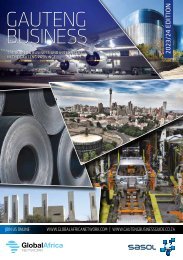South African Business 2021
Welcome to the ninth edition of the South African Business journal. First published in 2011, the publication has established itself as the premier business and investment guide to South Africa. This issue has a focus on economic recovery plans which have been put in place to tackle the challenges thrown up by the global Covid-19 pandemic. National government’s focus on infrastructure and the use of Special Economic Zones is highlighted, together with a feature on the nascent maritime economy. Regular pages cover all the main economic sectors of the South African economy and give a snapshot of each of the country’s provincial economies. South African Business is complemented by nine regional publications covering the business and investment environment in each of South Africa’s provinces. The e-book editions can be viewed online at www.globalafricanetwork.com.
Welcome to the ninth edition of the South African Business journal. First published in 2011, the publication has established itself as the premier business and investment guide to South Africa.
This issue has a focus on economic recovery plans which have been put in place to tackle the challenges thrown up by the global Covid-19 pandemic. National government’s focus on infrastructure and the use of Special Economic Zones is highlighted, together with a feature on the nascent maritime economy. Regular pages cover all the main economic sectors of the South African economy and give a snapshot of each of the country’s provincial economies.
South African Business is complemented by nine regional publications covering the business and investment environment in each of South Africa’s provinces. The e-book editions can be viewed online at www.globalafricanetwork.com.
You also want an ePaper? Increase the reach of your titles
YUMPU automatically turns print PDFs into web optimized ePapers that Google loves.
FOCUS<br />
Agro-processing potential<br />
Vhembe Region is the food basket of Limpopo<br />
province as it is endowed with various agricultural<br />
resources. some of which are sought after<br />
in lucrative world markets. Exotic fruits and<br />
vegetables are available in abundance, which<br />
creates a viable potential for agro-processing of<br />
value-added products for domestic consumption<br />
and export markets. Food production has over<br />
the years become a multi-billion industry that<br />
requires the creativity of entrepreneurs to exploit.<br />
Complemented by logistics support, the agroprocessing<br />
cluster of the MMSEZ is destined to<br />
become a big success over the next few years.<br />
Various opportunities exist within the agroprocessing<br />
cluster such as food processing,<br />
fresh-produce handling, dry-fruits packaging,<br />
food canning, timber processing, furniture<br />
manufacturing, etc.<br />
Manufacturing within the automotive sector<br />
<strong>South</strong> Africa has established itself as the<br />
powerhouse of the automotive industry in<br />
Sub-Saharan Africa. Over 10% of the vehicles<br />
manufactured in <strong>South</strong> Africa are supplied by<br />
road via the Beit Bridge Border post to markets<br />
to the north of <strong>South</strong> Africa in the SADC region.<br />
This window of opportunity makes the MMSEZ<br />
an ideal location for various opportunities across<br />
the automotive sector value chain such as vehicles<br />
and components manufacturing, storage and<br />
distribution hub, after-care products distribution<br />
hub, tyre manufacturing and distribution hub,<br />
etc. The manufacturing cluster of the MMSEZ will<br />
provide a platform for various Original Equipment<br />
Manufacturers to manufacture products in<br />
the SEZ for both domestic consumption and<br />
export markets in Africa and beyond. A strategic<br />
opportunity exists for manufacturers of products<br />
such as fertilisers, agro-chemicals, industrial<br />
chemicals, steel fabrication, etc.<br />
Sustainable development<br />
The <strong>South</strong> <strong>African</strong> Constitution enjoins us to pursue<br />
economic development in a sustainable manner<br />
and preserve the environment for the benefit of<br />
current and future generations. Section 24 states<br />
that everyone has the right to an environment that<br />
is not harmful to their health or well‐being and to<br />
have the environment protected for the benefit of<br />
present and future generations, through reasonable<br />
legislative and other measures, that prevents<br />
pollution and ecological degradation, promotes<br />
conservation and secures ecologically sustainable<br />
development and the use of natural resources<br />
while promoting justifiable economic and social<br />
development. This constitutional provision is<br />
supported by the National Environmental Act<br />
(NEMA) which provides that negative impacts on<br />
the environment and on people’s environmental<br />
rights must be anticipated and prevented, and<br />
where they cannot be altogether prevented, are<br />
minimised and remedied.<br />
Our country aspires to be a sustainable,<br />
economically prosperous and self‐reliant nation<br />
state that safeguards its democracy by meeting<br />
the fundamental human needs of its people,<br />
managing its limited ecological resources<br />
responsibly for current and future generations, and<br />
by advancing efficient and effective integrated<br />
planning and governance through national,<br />
MEC of Limpopo Economic Development Environment<br />
and Tourism, Thabo Mokone (left) and MMSEZ<br />
CEO Lehlogonolo Masoga at the launch of the MMSEZ<br />
Corporate Identity. Credit: MMSEZ<br />
SOUTH AFRICAN BUSINESS <strong>2021</strong><br />
SOUTH AFRICAN BUSINESS <strong>2021</strong><br />
28<br />
26


















